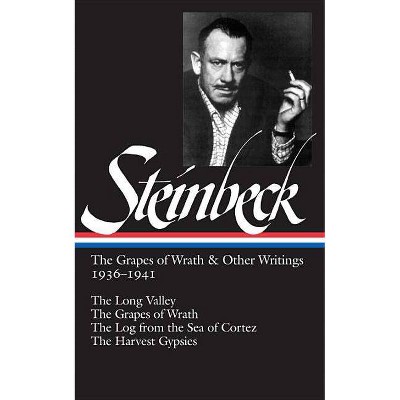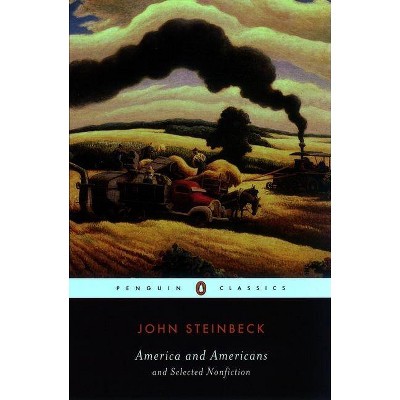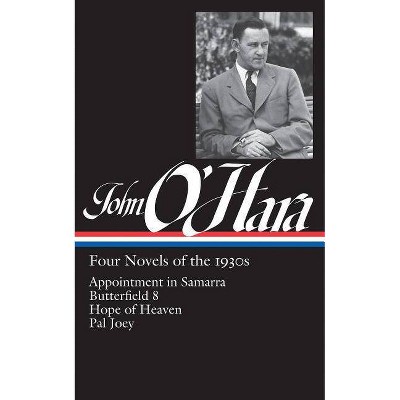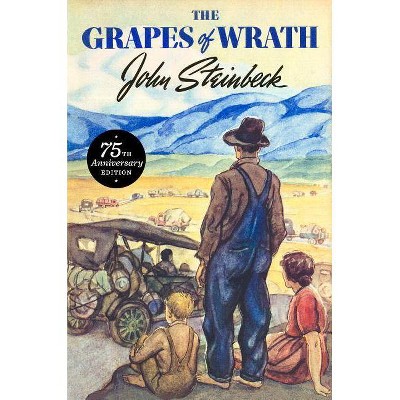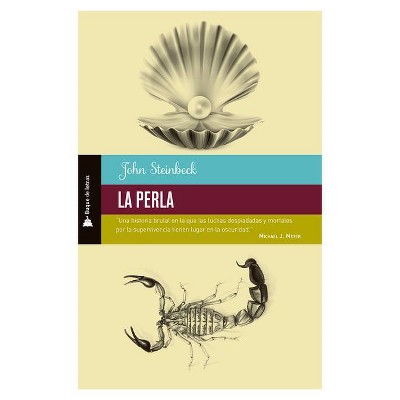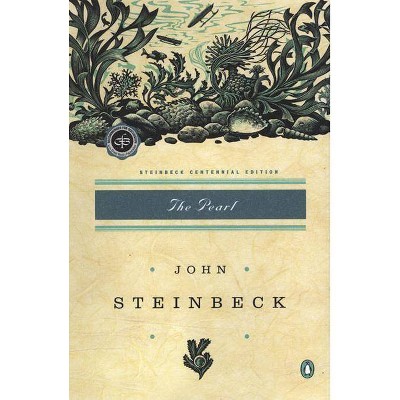John Steinbeck: Novels and Stories 1932-1937 (Loa #72) - (Library of America John Steinbeck Edition) (Hardcover)

Similar Products
Products of same category from the store
AllProduct info
<p/><br></br><p><b> About the Book </b></p></br></br>Here for the first time in one volume are John Steinbeck's early California writings, including Tortilla Flat, his first popular success, and the extraordinarily powerful Of Mice and Men. Featuring many other great works written by Steinbeck from 1932-37, this volume is the first in a projected multi-volume set.<p/><br></br><p><b> Book Synopsis </b></p></br></br>The Library of America presents for the first time in one volume Steinbeck's early writings, which expressed his abiding concerns for community, social justice, and the elemental connection between nature and human society. In prose that blends the vernacular and the incantatory, the local and the mythic, these five works chart Steinbeck's evolution into one of the greatest and most enduring popular of American novelists. <p/> <i>The Pastures of Heaven</i> (1932), a collection of interrelated stories, delineates the troubled inner lives and sometimes disastrous fates of families living in a seemingly tranquil California valley. The surface realism of Steinbeck's first mature work is enriched by hints of uncanny forces at work beneath. <p/> "Deep down it's mine, right to the center of the world," says Salinas Valley farmer Joseph Wayne about his land in John Steinbeck's <i>To a God Unknown</i> (1933). A sense of primeval magic dominates the novel as the farmer reverts to pagan nature worship and begins a tortuous journey toward catastrophe and ultimate understanding. <p/> Steinbeck's sympathetic depiction of the raffish <i>paisons</i> of <i>Tortilla Flat </i>(1935), a ramshackle district above Monterey, first won him popular attention. The Flat's tenderhearted, resourceful, mildly corrupt, over-optimistic characters are a triumph of life-affirming humor. <p/> <i>In Dubious Battle</i> (1936) plunges into the political struggle of the 1930s and paints a vigorous fresco of a migrant fruit-pickers' strike. Anticipating the collective portraiture of <i>The Grapes of Wrath</i>, Steinbeck poignantly traces the surges and shifts of group behavior. <p/> With <i>Of Mice and Men</i> (1937), Steinbeck secured his status as one of the most influential American writers. Lennie and George, itinerant farmhands held together in the face of deprivation only by the frailest of dreams, have long since passed into American mythology. This novel, which Steinbeck called "such a simple little thing," is now recognized as a masterpiece of concentrated emotional power. <p/><b>LIBRARY OF AMERICA</b> is an independent nonprofit cultural organization founded in 1979 to preserve our nation's literary heritage by publishing, and keeping permanently in print, America's best and most significant writing. The Library of America series includes more than 300 volumes to date, authoritative editions that average 1,000 pages in length, feature cloth covers, sewn bindings, and ribbon markers, and are printed on premium acid-free paper that will last for centuries.<p/><br></br><p><b> From the Back Cover </b></p></br></br>"Deep down it's mine, right to the center of the world", says a Salinas Valley farmer about his land in John Steinbeck's To a God Unknown, and Steinbeck the writer could have said the same. From the very start of his career he evoked the landscapes and people of central California with lyrical intensity and unflinching frankness. Through his intimate rendering of that place and those people, he expressed his abiding concerns: community, social justice, and the elemental connection between nature and human society. Here for the first time in one volume are Steinbeck's early California writings. In prose that blends the vernacular and the incantatory, the local and the mythic, these five works chart Steinbeck's evolution into one of the greatest and most enduringly popular of American novelists. The Pastures of Heaven (1932), a collection of interrelated stories, delineates the troubled inner lives and sometimes disastrous fates of families living in a seemingly tranquil California valley. The surface realism of Steinbeck's first mature work is enriched by hints of uncanny forces at work beneath. A sense of primeval magic dominates To a God Unknown (1933), as a California farmer reverts to pagan nature worship and begins a tortuous journey toward catastrophe and ultimate understanding. Steinbeck's sympathetic depiction of the raffish paisanos of Tortilla Flat (1935), a ramshackle district above Monterey, first won him popular attention. The Flat's tenderhearted, resourceful, mildly corrupt, ever-optimistic characters are a triumph of life-affirming humor. In Dubious Battle (1936) plunges into the political struggle of the 1930s, painting a vigorous fresco of a migrant fruit-picker'sstrike. Anticipating the collective portraiture of The Grapes of Wrath, Steinbeck poignantly traces the surges and shifts of group behavior. With Of Mice and Men (1937), Steinbeck secured his status as one of the most influential American writers. Lenny and George, itinerant farmhands held together in the face of deprivation only by the frailest of dreams, have long since passed into American mythology. This novel, which Steinbeck called "such a simple little thing", is now recognized as a masterpiece of concentrated emotional power.<p/><br></br><p><b> Review Quotes </b></p></br></br><br>John Steinbeck was a born storyteller of vividly interesting tales. His capacity to bring alive realistic scenes and authentic speech was really quite exceptional." <b>--<i>The New Criterion</i></b><br><p/><br></br><p><b> About the Author </b></p></br></br><b>John Steinbeck </b>(1902-1968) is the author of such celebrated works as <b>Tortilla Flat </b>(1935), <b>Of Mice and Men</b> (1937), and <b>The Grapes of Wrath</b> (1939), for which he won both the <b>National Book Award</b> and the <b>Pulitzer Prize</b>. He was awarded the <b>Nobel Prize in Literature</b> in 1962.<p>The editors of this volume are <b>Robert DeMott</b> and <b>Elaine A. Steinbeck</b> (1914-2003). Robert DeMott is the Edwin and Ruth Kennedy Distinguished Professor at Ohio University and the author of <i>Steinbeck's Typewriter</i>, an award-winning book of critical essays. Elaine A. Steinbeck, co-editor of <i>Steinbeck: A Life in Letters</i>, was married to John Steinbeck from 1950 until his death in 1968.</p>
Price History
Price Archive shows prices from various stores, lets you see history and find the cheapest. There is no actual sale on the website. For all support, inquiry and suggestion messages communication@pricearchive.us
